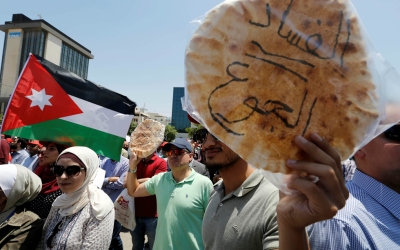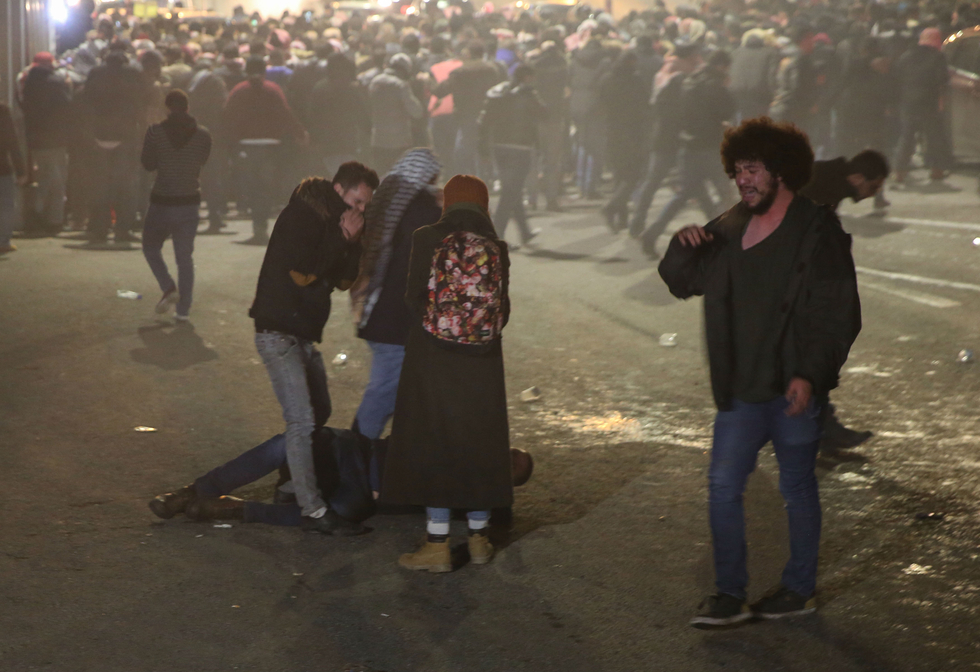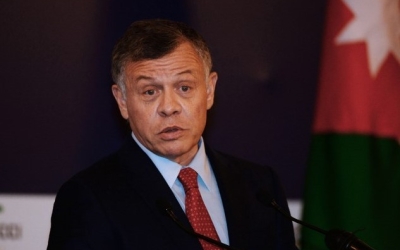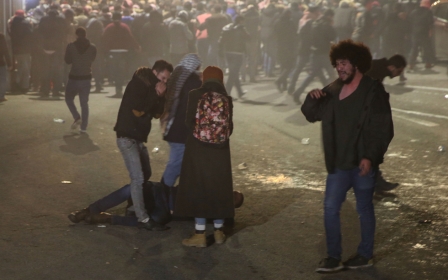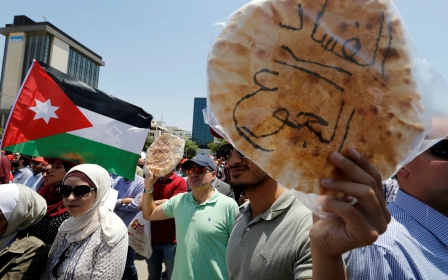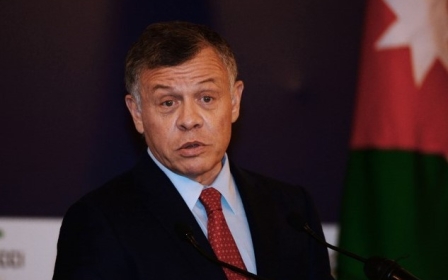Jordan's king facing mounting pressure as tribal support ebbs away
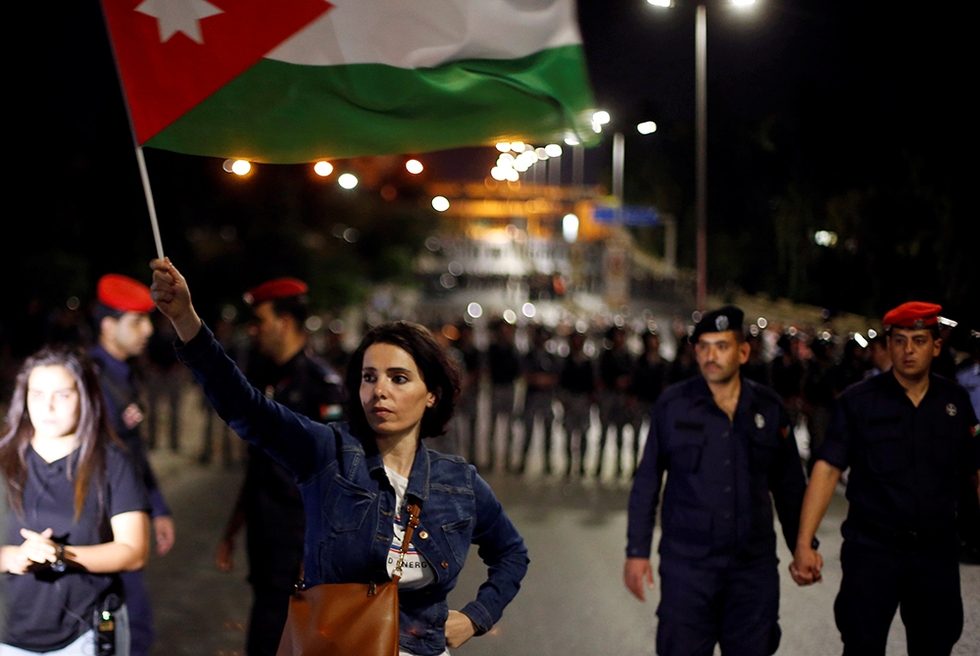
Hundreds of Jordanian protesters have been rallying every Thursday evening since 13 December near the prime minister's office in Amman, calling for a change in economic policy and political reforms.
The demonstrators' demands include the suspension of fuel taxes, the abolition of sales tax on basic goods, the release of all political prisoners and action against corruption.
In the first protest on 13 December, police used tear gas as at least 1,000 protesters gathered in the Jordanian capital.
The Hashemite Kingdom is battling a soaring unemployment rate that hit 18.6 percent in the third quarter of last year, rising inflation as a result of taxes on basic commodities and a national debt which stood at $39bn in 2018.
The protests are the latest in a round of demonstrations in Jordan that started with a labour union strike on 30 May over IMF-backed income tax hike plans, which then grew into daily demonstrations across the country attended by thousands of people.
New MEE newsletter: Jerusalem Dispatch
Sign up to get the latest insights and analysis on Israel-Palestine, alongside Turkey Unpacked and other MEE newsletters
That action resulted in the resignation of the prime minister, Hani al-Mulki, on the 4 June and his replacement by the king the next day with Omar al-Razzaz, who quickly scrapped the income tax hike plans.
Politicians on 18 November approved a new income tax bill after making amendments, but the measure has still caused anger.
Strikingly, the protests have included Jordanian tribal movements, most notably, the Beni Hassan tribe and the movement of the youths of Ahrar Abbad affiliated with the Beni al-Abbadi tribe.
The Jordanian tribes have traditionally maintained a strong relationship with the Hashemites, the ruling royal family of Jordan.
However, in the ongoing weekly protests since December, protesters not only lashed out at the Razzaz government but also chanted slogans against King Abdullah II.
Crossing red lines, the protesters, who called themselves the "sons of tillers" (awlad al-harathin), in reference to the low-income classes, blamed the king for the country's deteriorating economic situation and for not fighting corruption.
The protesters also expressed anger over what they see as the extravagance of Queen Rania, the king's wife, in buying clothes, which prompted the queen's office to clarify that her clothes are donations.
Arab Spring effect
The Hashemites, whose tribe originated from the Hijaz region in modern-day Saudi Arabia, were pushed out by the al-Sauds in the 1920s after years of conflict in the Arabian Peninsula.
The Hashemites were welcomed by other tribes in Jordan, such as Beni Hamaideh, Beni Sakhr and Beni Hasan, after the First World War, and were instated as the country's ruling family with British military and political support.
Tribes have historically received special treatment in terms of government employment, but the relationship between the royal court in Amman and the Jordanian tribes has changed since 2011.
The popular movement, and the involvement of tribes, began with organised protests in 2011 within the scope of the Arab Spring.
The Dhiban region, in the south of Amman, was the centre of Jordan’s uprising in 2011, with demonstrators calling for political reforms and protesting over their living conditions, an inheritance-based alternation of power and the rotation of the same figures in high state positions.
The 2011 movement was able to break the citizens' fear barrier of the ruling establishment, and started criticising the government and the regime.
Against the backdrop of a spike in fuel prices under the government of Abdullah Ensour in 2012, citizens dared to even call for the overthrowing of the regime.
Decline in tribal benefits
Before 2011, members of the tribes were typically offered positions in state institutions with good security and benefits in exchange for loyalty.
However, such benefits and positions have begun to disappear over the years as the economic situation has worsened.
Mohammed al-Sunaid, a member of a Bedouin tribe from the city of Madaba, who works at the Ministry of Agriculture, is seen as one of the most prominent activists in the recent popular movement.
"Jordan's governments have misused the country's assets and sold them at cheap prices through privatisation. Add to this, the rise of state debts," he told Middle East Eye.
"Tribes under the reign of King Abdullah II were severely frustrated with the management of the state.
"They started protesting since the state's management approach affected their lives, with soaring rates of poverty and unemployment."
Former MP Hind al-Fayez, who is also a member of one of Jordan's largest tribes, said she believes the opposition's political thinking has radically changed.
"This is manifested by the street movement called by the governorates, the tribes and even the Palestinian refugee camps," she told MEE.
Fayez participates in the weekly sit-in protest near Razzaz's office and raises the slogan that calls for reforming the ruling regime.
"The regime was able to buy the loyalty of tribal leaders. But this does not reflect the tribes' position toward the regime's policy.
"The movement on social media has shown awareness and shed light on tribal figures leading the popular protests."
'Weak and socially hated figures'
The young liberal King Abdullah II bin al-Hussein ascended the throne in 1999 with a declared ambition to establish a civil state amongst the tribal society.
The king has been accused of weakening the position of tribes in Jordanian political and social life - primarily through appointing their leaders, or sheikhs, himself.
The tribes consultancy, a body in the Hashemite royal court, now decides who is accepted as a tribal rather than through primogeniture.
Critics say appointed sheikhs now look to use their positions to benefit themselves and their children, always obeying the king rather than defending the tribe's members.
Tribal leaders have also found themselves marginalised in favour of liberal figures.
Ataf al-Rawdan, the director of Balad Radio, who has a tribal background, told MEE: "The political regime in Jordan, represented by the monarchy, made a mistake in dealing with the tribal system in Jordan.
"It sought to establish a civil state by disposing of the tribal system that historically supports the regime and the state.
"During the reign of King Abdullah II, the regime has excluded influential tribal leaders and replaced them with weak and socially hated figures."
Impoverishment policy
The International Monetary Fund’s (IMF) economic liberalisation programmes, first implemented by Jordan in 1989 following a severe economic crisis, have further strained the regime's relationship with tribes.
The programmes have formed the core of successive governments' economic policies which applied the IMF conditions to obtain soft loans.
Governments have repeatedly increased the prices and fees of basic goods, as well as privatising public institutions.
The measures have been seen by Jordanians as part of an impoverishment policy.
Labib Kamhawi, who has a PhD in political science from the University of London, also points to the rise under the king of what the Jordanian opposition calls neoliberals, who are aligned with Western thought.
He told MEE: "Jordanians feel that this group does not belong to Jordan or empathise with the suffering of citizens.
"They believe this group wants to impose its own economic vision, including privatisation."
Kamhawi added: "Economic reasons and social demands impacted the tribes' political opinion.
"The Jordanian tribes have come to believe that the king is in charge of [the] country's affairs and they blame him for the prevailing hardship, high costs of living and impoverishment policies.
"They no longer see the government as the governing authority but rather as incapable of changing the situation of the country."
Joining the opposition ranks, tribal figures have demanded the restitution of the funds of privatised public institutions and called for action against allegedly corrupt figures, some closely linked to the royal family.
King's response
In an attempt to ease the tension and anger of protesters, King Abdullah II instructed the government in December to issue a general pardon that could see thousands of Jordanians released from prison.
The government says the pardon would waive thousands of traffic fines and benefit between 5,000 to 8,000 people awaiting trial or in jail.
However, critics say the draft law is not wide enough in scope and fails to include people in prison for defaulted loans and debt.
The king has also made two public appearances in an apparent bid to gain more popularity.
In December, he was spotted in a mosque praying among citizens without security guards and in the same month was also seen in a popular Amman restaurant eating falafel with his family.
Last month, the king invited Jordanian cleaning worker Khalid Al-Shumali to his palace to watch the Asian Cup game match between Jordan and Syria. An image of Al-Shumali straining to catch a glimpse of the previous match between Jordan and Australia through a glass window of a cafe in Amman had gone viral.
The king also held a series of press interviews in December, during which he expressed his optimism in Jordan's future and its great potential.
Meanwhile, with the Jordanian government saying it is serious about stopping corruption, a former customs chief, an ex-minister and a top businessman were among 29 suspects charged earlier this month with corruption in a case involving fake cigarettes.
Whether the king's and the government's recent actions can make any impact on the highly damaged relations with the country's tribal movements remains to be seen.
This article is available in French on Middle East Eye French edition.
Middle East Eye delivers independent and unrivalled coverage and analysis of the Middle East, North Africa and beyond. To learn more about republishing this content and the associated fees, please fill out this form. More about MEE can be found here.


